|
If you're new to The Avengers and are wondering what the show all about, then I'd check out our review of Series 1 and 2, which sets the scene and introduces the characters, and so does not need repeating in detail here. For those in need of a quick recap, series 1 starred Ian Hendry as Dr. David Keel and Patrick McNee in a supporting role as the slightly shady John Steed. With Hendry's departure Steed moved up to the lead and three candidates were tried out as potential co-stars. Far and away the best and most popular was the super-smart, leather dressed anthropologist and judo expert Cathy Gale, deliciously played by Honor Blackman. By the end of series 2 it was clear that she was here to stay.
Series 3 sports new opening titles but otherwise keeps to the established format, with Steed once again working for an unspecified branch of the government and regularly roping Cathy into helping him, often against her better judgement and by sometimes devious means. The surrealist and fantasy elements that set The Avengers apart from any other secret agent based drama are as strong as ever, and if you're going to get the most from the show then you need to embrace that aspect and accept that in this world realism sometimes gives way to style and invention. Thus we accept without question that cases are solved as much by chance as by hard work and investigation, that Steed's people are able to arrange false background details so convincing that they stand up to even the most detailed research, that Cathy can get any job she applies for without being bothered by interviews or rival candidates, and that Steed and Mrs. Gale can use their real names on every case without worrying that they might eventually become known to the criminal fraternity.
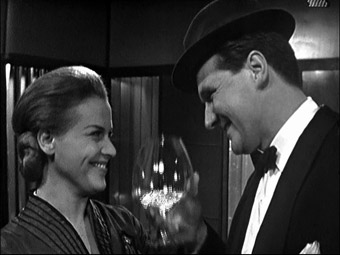
Watching all twenty-six episodes of series 3 consecutively in the space of a week and a half, I was once again very aware of the reoccurring elements, particularly a plot structure in which something peculiar occurs and is investigated by Steed and Cathy, usually by impersonating officials and/or landing jobs with the connected companies, then builds to a climax in which conflict is resolved with fisticuffs and guns, but the variations on this formula are so inventive that it rarely matters. The repeated use of the same four or five music cues throughout the series (the one with the plinky xylophone is instantly recognisable and would not he out of place in an episode of The Prisoner) also hits home, but is the result of having to play the music live as the show was recorded rather than the current practice of scoring the episode afterwards.
With his Saville Row suit, bowler and umbrella, this is the Steed all will recognise from later episodes and what really stands out here is how comfortable McNee has become with the character, littering each performance with enough lovely little touches (breaking into a medical lab in one episode, he pauses and briefly to doffs his hat to a skeleton before moving on) to make the series worth watching for him alone, but Blackman is also a constant delight, a leather-clad voice of logic and reason who is both highly desirable and strongly independent. She's also consistently tougher than any of the male foes she faces. This was, of course, Blackman's last series with The Avengers, her departure to play Pussy Galore in Goldfinger amusingly signalled at the end of the final show.
As with the series 1 and 2 release, the original transmission order of series 3 has been jumbled up a bit here – I've covered the episodes in the order in which they appear in the set and put the original transmission order in brackets after the episode title.
Concerto (24)
Episode 1 of series 3 (actually episode 24 by the original air date) gets off to an intriguing start when a woman enters the hotel suite of visiting Russian concert pianist Stefan Veliko (Sandor Eles) on the pretext of interviewing him for a magazine article, then tears her clothes and claims she's been assaulted. A scam is afoot, but comes an unexpected cropper when a hotel official answers her call for help and promptly throttles her. Steed and Cathy are called in to investigate and soon suspect that the whole thing has been set up to implicate Veliko and sour the trade talks with Russia that his tour has been timed to quietly promote.
An interesting enough set-up for a story that plods a little in places, it is enlivened no end by Steed's exchanges with his Russian counterpart Zalenko (delightfully played by Nigel Stock) and a sequence in which Cathy is introduced to the joys of Russian roulette. The final scene, in which Steed and Zalenko drunkenly exchange espionage stories, is a notable highpoint.
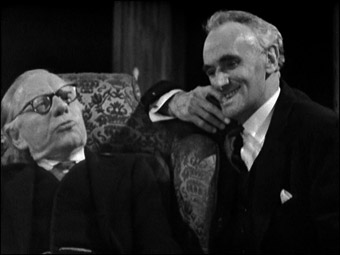
Brief for Murder (1)
Steed and Cathy fall out when the former helps a traitor to beat his conviction using a string of legal technicalities, the work of elderly lawyers Jasper and Miles Lakin, who are building a reputation for helping seemingly banged-to-rights clients to beat the rap. They are able to do this because they plan the crimes in the first place and are thus able to arrange the evidence in such a way that an acquittal is guaranteed, a service Steed calls on so that he can kill the bothersome Mrs. Gale.
This was originally the series opener, and back in 1963, without foreknowledge of what was to come, you might just have bought the idea that Steed and Mrs. Gale had fallen out since the end of series 2, but as the epiusode stands here we're not fooled for a minute. It's still a splendid set-up and enormous fun, thanks to a pair of joyously eccentric performances from John Laurie and Harold Scott as Japser and Miles Lakin, and some inspired camera direction from series regular Peter Hammond. The defence trick of demonstrating to the court that the hat found at the crime scene is a total mismatch for the Steed's head can't help but prefigure that famously undersized glove in the O.J. Simpson trial.
The Nutshell (4)
When a microfilm containing a list of double agents is stolen from a supposedly secure underground military bunker, the subsequent investigation points the finger squarely at Steed as the job's inside man, seemingly confirmed when he actively prevents the arrest of one of the escaping thieves.
Despite her concerns, Cathy can't quite believe that Steed is really a traitor and neither can we, but by not revealing the reasons for Steed's behaviour, writer Philip Chambers and director Raymond Menmuir keep the intrigue on the boil and the audience guessing up until the final act. Steed's interrogation is peppered with very British eccentricity, as the exhaustive questioning and sleep deprivation is put momentarily on hold so that he can enjoy a good meal with a fine wine and switch in an instant from weary prisoner to cheerful man-about-town. Brief talk of Mutually Assured Destruction adds a dash 60s topicality.
The Golden Fleece (11)
After dining with Cathy at a Chinese restaurant, Steed picks up the wrong coat and finds a cheque for £5,000 from a Taiwanese bank in the pocket. Instead of returning the garment to the restaurant, he waits to hear from its rightful owner, who turns out to be serving officer Captain Jason (Warren Mitchell in his pre-Alf Garnett days), who with three of his fellow army officers is involved in some shady dealing with local Chinese kingpin Lo (Robert Lee).
One of those episodes where Steed angers Cathy (and amuses himself) by manipulating her, while the true reasons for the officers' actions are not what you might expect. The idea that Steed may have more than a professional interest in Cathy briefly surfaces when she complains about having to work to pay the rent and he suggests "a more amicable arrangement," something she quickly dismisses.
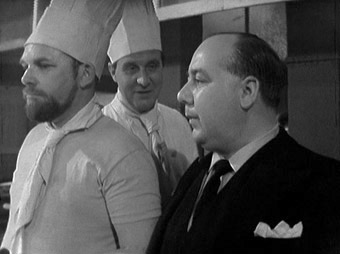
Death a La Carte (13)
When Middle Eastern emir Abdulla Akaba (Henry Soskin) arrives in London for a health check, Cathy is assigned to look after him by posing as social director of the plush hotel in which he is staying. Battling to one-up each other in the hotel kitchen are top chefs Lucien (Gordon Rollings) and Umberto (David Nettheim), an Italian gourmet who, like the Indian steward in Richard Lester's later Juggernaut, is actually a Londoner wearing a foreign accent for effect. Joining the pair to help prepare the best meals for the emir is new chef Sebastian Stone-Martin, aka John Steed, who is apparently a better cook than Cathy gives him credit for. It quickly transpires that Akaba's personal assistant Melor and his bodyguard Ali – who looks like a hit man from De Palma's Scarface – are in league with chef Lucien to poison their boss and seize power back home. Steed and Cathy, naturally, are out to stop him.
A slightly frothy but still enjoyable episode, not least for the sight of Steed playing the master chef and for Cathy's resourceful approach to escaping captivity.
Man With Two Shadows (3)
A government official named Bill Gordon (Daniel Moynihan) is killed and replaced with his exact double by a group based at the holiday camp at which he was staying. Acting on information provided by brainwashed and half-mad agent Borowski (a colourful turn by Terence Lodge), Steed and Cathy visit the camp to investigate, but a replica Steed is already being prepared for their arrival.
An ambitious and thoroughly engaging episode that looks forward to the more fantasy-led stories of the Emma Peel years, but covers its reality base rather well thanks to a pair of very plausible performances from Geoffrey Palmer and Anne Godfrey as the doctor and dentist called in by Steed to check on the fake Gordon. The fun factor is upped when neither Cathy nor the audience is certain whether she's talking to the real Steed or his double, and we get a tantalising taste of Steed's back story when it's revealed that he's the only agent ever to escape after being captured by Borowski's group. We also learn he's rather fond of the Tin Tin comic strips.
Don't Look Behind You (12)
Invited to spend the weekend at the country home of Sir Cavalier Rasagne, a renowned authority on medieval costume, Cathy finds the house inhabited solely by Rasagne's niece Ola (Janine Gray), who behaves a bit like she's swallowed some LSD and a book on a How to Be a Moonchild. Eventually Ola drives into town and leaves Cathy alone with some strange noises and objects that seem to move of their own accord, and is visited by a wired young man who seems to have taken even more drugs than Ola (a wild turn by a young Kenneth Colley). As the troubling incidents continue, it looks increasingly as if Cathy has been specifically targeted for something bad.
Writer Brian Clemens almost draws up a blueprint for the direction the series was to take under his later guidance with a story that plays as a murder mystery melded with haunted house horror. Peter Hammond, regularly championed as the most creative director of early Avengers series, gets imaginative with his camera angles and delivers an opening sequence in which Steed drives Cathy to the house that appears to be all shot on film. A damned good episode, and at times a genuinely creepy one.
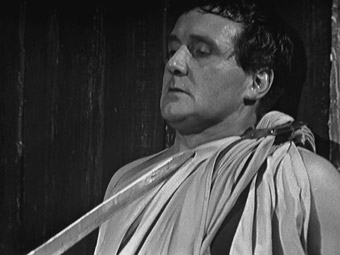
The Grandeur That Was Rome (10)
Investigating reports of a series of unprecedented crop failures, Steed and Cathy consult the research department of United Food and Dressings, a company they begin to suspect of being behind the problem. Chief suspect is its chairman Bruno (Hugh Burden), a kingpin in the World Empire Party who is planning to wipe out most of the population and install a ruling body based on that of Ancient Rome with himself as Caesar. Little does he know that his first in command Marcus (John Flint) and wife Octavia (Colette Wilde) are plotting behind his back.
An enjoyable if somewhat unlikely episode – Bruno intends to establish a new society by wiping out the very people it would need to sustain it – whose highpoints involving Steed's cheery investigations ("What are they doing?" he enquires of the decoration on a vase depicting an orgy) and Cathy's no-nonsense resourcefulness, though it also includes the biggest cheat of the series by providing no explanation for a Steed's escape from a fight he is clearly shown to have lost. A very contemporary element, given current terrorist paranoia, has Bruno planning to kill the populace by poisoning the national water supply.
The Undertakers (2)
The road to later surrealism is signposted again by an opening that sees four undertakers soberly carry a coffin into an office whose occupant they then kill and cart away. When the victim's daughter returns from her Swiss finishing school, she's informed that her father been taken ill and is resting at the very private Adelphi Park Retirement Home, the exact place a man named Professor Lomax – whom Steed was due to accompany to New York on official business – has suddenly and unexpectedly retreated to. To reveal more would spoil the unlikely but rather ingenious plot that unfolds.
A hilarious first encounter with our lead characters has Steed's persistent attempts to turn on the charm all but ignored by Cathy as she cleans and assembles an automatic rifle, but stealing every scene she's in by a mile is Marcella Markham, who plays Professor Lomax's elderly wife in the style of a wide-eyed, persistently upbeat and dotty Joyce Grenfield. Some neat work all round by writer Malcolm Hulke and director Bill Bain neatly executes and then amusingly undercuts a moment of old school Universal horror when he reveals the secret entrance to a cellar hideout. Most unusually, the climactic chase and battle in the Adelphi grounds is shot on location.
Death of a Batman (5)
Steed attends the funeral of his wartime batman Wrightson and is surprised to learn that he has left his wife a sum of money that he could never have made on his modest draughtsman's wage. Investigations lead Steed and Cathy to a financial firm co-run by Lord Teale (André Morell), for whom Wrightson was batman during the previous war.
Wall Street eat your heart out – well, not quite, but it's still surprising to find the subject of insider trading dealt with in a 1963 British TV series. Like Stone's drama of 80s greed, you'll need a little understanding of how these people operate to make complete sense of what they're talking about and plotting, though writer Roger Marshall keeps it as clear as he can. A solid episode enlivened by a typically stoic performance from Philip Madoc (who also featured twice in series 2) and florist Lady Cynthia (Katy Greenwood), who goes dotty for Steed after he knocks out her bodyguard.
Build a Better Mousetrap (21)
The leather-dressed Cathy joins a motorcycle gang for a trip out to the country and in their search for the field they've been given permission to use, they knock on the door of an old mill inhabited by elderly sisters Cynthia and Ermyntrude Peck, who threaten to put a spell on them. Steed is also in the area, investigating a series of incidents in which electrical machinery has inexplicably stopped working – local opinion blames the nearby atomic research establishment, but just what is it that the Peck sisters are cooking up in their attic?
The dynamic duo of writer Brian Clemens and director Peter Hammond create an almost Ealing-like blend of scientific mystery and English eccentricity that sees Steed pursued by the apparently love-sick Caroline (Alison Seebohm) and impersonate a representative of "The National Mistrust," while Cathy fits in just fine as a biker girl. A lively shot-on-film opening showing the bike gang on the move gives way to a more unlikely but surprisingly positive portrait of the good-natured group, who move into their designated barn and spend every waking minute drinking Pepsi and dancing the twist.
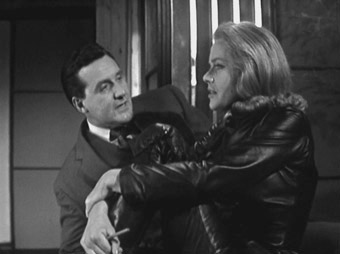
November Five (6)
Steed and Cathy investigate the death of Michael Dyter, a newly elected MP who is assassinated during his acceptance speech after promising to expose government attempts to cover up the loss of a nuclear warhead. As MPs and former enemies Major Swinburne (David Langton) and Arthur Dove (David Davies) draw up their own plans with PR man Mark St. John, Cathy joins a gym class of politicians' wives and announces she'll be standing in Dyer's place with similar promises to expose the scandal. As you might imagine, plans to eliminate her are soon in motion.
It's a story in which party politics play a part but where none of the parties themselves are named, but with candidates like Major Swinburne and Arthur Dove, who talks to Cathy of his working class upbringing and whose wife wears her northern accent with pride, it's not hard to work out who is standing for whom. The role of the political image maker is also touched on here, decades before the term Spin Doctor would even be coined, and a touch of Ealing is brought to the proceedings by the two old ladies who intermittently pop up and twitter to Steed about parliament and its workings.
Second Sight (8)
Steed is involved (the exact nature of which is kept typically vague) in the transport of human corneas that are to be used to restore the sight of Martin Halvarsson (John Carson), a millionaire who was blinded in the second world war. Steed persuades Cathy to pose as a doctor and check on the medical team, and when one of them ends up dead after expressing concerns about the procedure, suspicions are raised that there's more going on here than meets the eye (sorry about that).
An interesting mix of medical mystery and the politics of power play that may be a little short on clever twists, but it builds rather well on that innate distrust we seem to have the medical profession and the creepiness of eye surgery in general, especially when it's revealed that the corneas came from a live donor (eek).
The Secrets Broker (19)
An old colleague of Steed's named David Marshall (also the name of the one of the series' set designers – a complete co-incidence of course) is found murdered in an alley near a scientific research centre. Cathy nips along to investigate in the guise of a ministry inspector, while Steed pokes around a wine shop to which Marshall may have been connected. This establishment is run by a man named Waller (Jack May, whose voice here is like a baritone version of Alec Guiness's Fagin), whose partner Mrs. Wilson (Avice Landon) poses as a medium and is blackmailing the vulnerable into committing everything from industrial espionage to murder.
Another enjoyable blend of science, skulduggery and inventive hokum, which sees Steed in his element with his nose in a wine glass or entertaining the ladies, while Cathy does the serious stuff with the scientists. There's also an indication of the early 60s British attitude to nudity and race when Cathy screens a slide of a topless African tribeswoman and we are shown the image pretty much full screen – "Very nice," observes Steed with one of his grins.
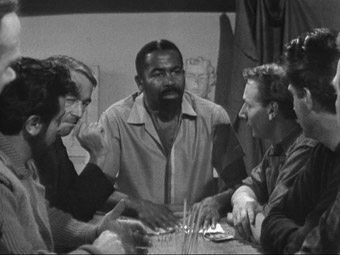
The Gilded Cage (7)
Cathy takes Steed on a tour of the security systems at the gold bullion storage facility at which she's now working and that the two are apparently planning to rob. Steed takes the proposal to criminal mastermind J.P. Spagge (the inimitable Patrick Magee) who is simply not interested – "You're fifteen years too late," he tells him. Steed is not convinced, but before they can take further action Cathy is arrested by Scotland Yard for Spagge's murder. A while later she wakes from a drug-induced sleep to the news that she has already been tried and found guilty and is now awaiting execution for the crime.
In a season with a few too many stories built around the "something happens, Steed and Cathy investigate, it all ends in a fight" formula, regular writer Roger Marshall delivers a welcome break from the norm and one of the most deliciously devised and structured plots of the whole third series. A superb first act ends on a real cliff-hanger moment and the quality doesn't drop once you do know what's going on. Just how how it will all be resolved remains uncertain right up to the final scene, which proves the only by-the-book element in an otherwise excellent episode. Magee is always a joy (confined to a wheelchair as he is here, he spookily prefigures his memorable performance as Mr. Alexander in A Clockwork Orange), but almost all of his scenes are stolen by Norman Chappell as his primly fastidious butler Fleming.
The progressive nature of the show is reflected in a strong supporting role for black actor Edric Connor, whose character is on an equal footing with his colleagues and even looked up to by them (this is 1963, remember), and if you've never been completely sold on Honor Blackman's status as a sex goddess then just watch that final expression and lip lick...
The Medicine Men (9)
A Chinese woman investigating the production of counterfeit goods in the Far East is murdered in a London Turkish bath. Steed pays a visit to Willis-Sopworth Pharmaceuticals, one of the companies most affected by the fake goods scam and talks to managing director Geoffrey Willis (Peter Barkworth), while Cathy gets a massage and spots a clue when she follows a girl with paint stains on her body into the shower. Gale fans will like this scene a lot – I certainly did. The girl's name is Fay and she once modelled for Willis-Sopworth advertisements and is now the girlfriend of company chairman John Willis (Newton Blick), who's also Geoffrey's father. She's also modelling for action painter Frank Leeson (Harold Innocent), who is providing design photos of Willis-Sopworth products to forger Taylor for the production of fake product boxes. Are you getting all this? Cathy bluffs her way into the company as a 'business efficiency' advisor and has only been there a few minutes when she finds the body of the company's technical bod Edwards hanging in the stationery cupboard.
An enjoyable if rather coincidence-heavy tale in which Steed does some breaking and entering and dons a big coat and a fat cigar to impersonate a Reykjavik art dealer, and Cathy gets to beat one of the bad guys with one eye covered and her hands tied behind her back.
The White Elephant (15)
A small white elephant named Snowy is stolen from a zoo that specialises in capturing and distributing rare animals. Cathy's experience in Kenya lands her a job there and the information she gleans leads Steed to the gunsmith that supplies zoo owner Noah Marshall, then to the firm that supplies the zoo's cages, which the pair suspect are being used to smuggle ivory.
An engaging if intermittently formulaic episode – act 1 end ends in exactly the same manner as its equivalent in the previous show – which is enlivened considerably by its setting, which surrounds the characters with caged animals and even plonks a parrot on Marshall's shoulder (he also takes a snake on night time inspections). The sequence in which Cathy and Steed discuss the case while meditating – he by balancing wine glasses on his forehead, she by standing on her head – is typically offbeat. Irregular Avengers face Edwin Richfield pops up as Snowy's real owner Professor Lawrence.
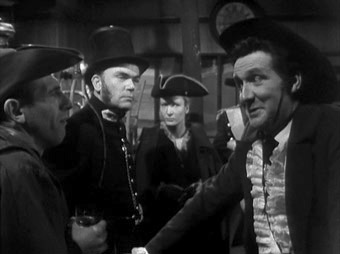
Dressed to Kill (14)
Steed is called away from his own Christmas bash when a false nuclear missile attack is detected by all of the country's early warning stations except the one based at Small Wood in Cornwall. Before investigating further, he attends a New Year party being held on a passenger train that's been organised by an old friend of his. Or has it? The train is on the move and the party well under way before the guests realise that they've all been invited by different people, and when the train comes to a stop they discover the locomotive has departed and the station is deserted. What, exactly, is going on?
Another small gem from the pen of Brian Clemens that blends Ten Little Indians with political intrigue and takes its good time before showing its hand. Director Bill Bain has some fun with Steed's cowboy costume, adding western music and staging a quick-draw final shoot-out, though few will be surprised at the identity of the mysterious figure dressed in the monk's cassock. Steed reveals that he's recently been on a handcuff escapology course that failed to cover Victorian devices, and there's an extra treat in a supporting cast that includes familiar faces John Junkin and Leonard Rossiter in full Rigsby mode.
The Wringer (17)
Following the disappearance of six British agents on the Carinthia pipeline, Steed is sent to locate the seventh, an old colleague of his named Hal Anderson (Peter Sallis, later to provide the voice of Wallace for Nick Park), who promptly fingers Steed as a traitor and transports him back to London to face the music. After hearing the evidence against him, Steed's superiors hand him over to an interrogator known as The Wringer, who transports him to a secret facility and sets about trying to break him.
Plot then takes a back seat to the methods employed by The Wringer to brainwash Steed, a combination of time disorientation and visual and aural sensory assaults, which when combined with the cage-like cell in which Steed is imprisoned have an uncomfortably contemporary ring, particularly in their similarity to reports of the treatment of prisoners in Abu Graib and Guantanamo Bay. Cathy's heartfelt admonishment of Steed's boss – "You've tried to sweep the whole thing under the carpet and forget about it, that's why you don't know it's gone bad on you" – carries considerable clout because of the number of real world examples this could still be applied to. Don Leaver directs from a strong Martin Woodhouse script.
The Little Wonders (16)
The Bishop of Winnipeg (American actor David Bauer) calls a meeting of the various representatives of an international clerical group known as Bibliotek to announce that he is not long for this earth and that the time has come to select his successor. But Bibliotek is no religious organisation but a front for an international band of seasoned criminals, one of whom – The Reverend Harbuttle – is intercepted by Steed on his arrival in Britain. A search of his belongings uncovers a rare but damaged German doll, which Cathy takes to a specialist doll hospital for repair, while Steed takes Harbuttle's place and infiltrates the Bibliotek meeting as the Reverend Steed, aka Johnny the Horse.
The two stories are linked, of course, but it's Steed's adventures in the underworld that provide the most amusement and some genuine tension, as characters like Big Sid (John Cowley) and Fingers (Kenneth J. Warren) plot their individual takeover bids and attempt to buy up Steed's vote, and the Bishop's nurse turns out to be a lot more than his suspicious sidekick. Cathy does one of her best no-nonsense beat-ups here, when she quickly dismisses the shade-wearing Hasak (Frank Maher) and returns to her business as if nothing had happened. For the first and last time Steed actually gets to kiss Cathy, but only as part of her cover as his girlfriend.
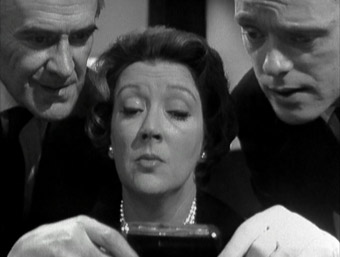
Mandrake (18)
When a man Steed was once "in a few scrapes" with dies of apparently natural causes and is buried far from his London home in the small Cornish town of Tinbey, Steed and Cathy discover that he's not the first well-to-do former London resident to end up in the Tinbey graveyard. It's all the work of a man named Hopkins (Philip Locke), who is working with a Dr. Macombie (the always lovely John Le Mesurier) to provide a rather special service for those looking to get rid of wealthy relatives. But why bury them in Tinbey?
One of those stories that let's us in on what's happening at an early stage but keeps why a secret, and the explanation when it finally comes has a surprisingly plausible ring. The road to its discovery is most engaging one, with a bevy of small twists and offbeat characters (George Benson is a joy as the splendidly named Reverand Whyper) and Cathy involved in a spectacular graveyard scrap with a gravedigger played by wrestler Jackie Pallo, whom Honor Blackman famously knocked out during the filming of the scene (the key blow is easy to spot). The fake exterior sets are something else – you'd swear this some of this was filmed on location.
The Trojan Horse (20)
Steed is sent to a secure stable owned by George Meadows (Arthur Pentelow) to keep an eye on the horse of a sultan whose country Britain is involved in "delicate negotiations" with, and by chance stumbles on a deadly race-fixing racket being run by bookmaker Tony Heuston (T.P. McKenna).
You'd think Steed would be completely at home at the race track, but while he chats up the ticket office girl it's Cathy who cleans up on the bets. Her confident financial track talk is convincing enough to sell the idea that Heuston really would hire her on the spot, and can't help but suggest that writer Malcolm Hulke has put a few bob on the horses himself in his time. One of those episodes where we're quickly clued in to what's going on and whose enjoyment comes from watching Steed and Cathy uncover it for themselves.
The Outside-In Man (22)
Five years after defecting to a terrorist group, a Briton named Sharpe is due to return to London under diplomatic immunity to broker an arms deal on behalf of the Aburanian government. Steed is put in charge of security for the visit, but out of the blue an agent named Mark Charter (James Maxwell), one of several captured and presumed killed while attempting to assassinate Sharp five years earlier, reappears at headquarters after being inexplicably released by his captors. What, exactly, is the connection?
A smartly developed and compact little espionage thriller from Philip Chambers that keeps you guessing in the first half, then repeatedly tricks you into thinking you've sussed where the plot's going in the second. Steed once again refers obliquely to his past, another "unfortunate incident" that later may prove to have been a bluff, and the episode is given extra bite by some still very relevant subtextual elements, from how the government treats its former operatives to that western habit of brokering arms deals with people we previously condemned or later call terrorists. Cathy is introduced via a shot of a her leather-clad posterior and later gives us a flash of her garter holster, but she also gets the episode's most telling character moment when Helen Rayner, the wife of the man who was captured with Charter, tells her bitterly, "You don't know what it's like to be made a widow," only to receive the stern reply, "Yes, I do." A fine episode all round.
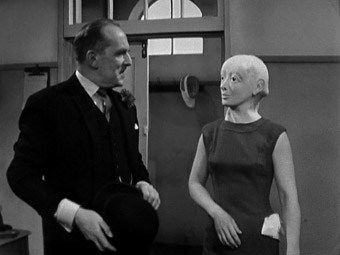
The Charmers (23)
When an agent from "their side" is killed, Steed is targeted as the man responsible, but a meeting with his opposite number Keller (Warren Mitchell's second appearance this season) confirms that the hit was carried out by an unknown third party, whom the two then cooperate to expose. To that end they agree to provide an agent from each side to help the other – Steed nominates a reluctant Cathy, unaware that Keller is setting him up with an actress who knows nothing whatsoever about the spy game and has been told she's helping a mystery novel writer with his research.
Writer Brian Clemens spins an enjoyable espionage yarn and has some fun with the format in the process, particularly in Keller and Steed's banter over expenses and their cheerful memory of a lift assassination, though the teaming of Steed with the sultry Kim (Fenella Fielding) intermittently skates close to Carry On territory. It's still a nicely plotted piece with a sprinkling of recognisable Clemens touches, from the regimented quartet of bowler-hatted gents to a mask that transforms its wearer into the image of what would later become one of the most memorable creations of series 4, The Cybernauts.
Esprit de Corps (25)
A Highland regiment comes under suspicion when the body of a soldier killed in a tragic gun-cleaning accident is found to contain bullets from three separate rifles. Steed and Cathy look into the matter from different angles, Steed as an ex-army major researching a new book, Cathy in search of self-defence lessons she could probably teach at degree level, and the pair uncover a plot to turn a routine military exercise into a military coup to place Britain under Scottish sovereignty.
Some tense moments and unlikely escapes in an episode with a stellar supporting cast that includes Duncan Macrae, John Thaw and the inimitable Roy Kinnear, who plays to type by accepting bribes and nicking whisky from officers during a fire alert. A brief dose of middle class British humour occurs when Lady Dorothy Stuart-Bollinger, the wife of the man in charge of the operation, complains that their son has become a bookmaker and that "we should never have sent him to Eton."
Lobster Quadrille (26)
When a former colleague dies in a fire under suspicious circumstances, Steed enlists Cathy's help to chase up a curious lead, a valuable and ornately carved chess piece found in the man's possession. Cathy's enquiries lead her to a chess shop run by Mason (the always wonderful Burt Kwouk), while Steed poses as a rep from the Ministry of Agriculture and Fisheries to investigate the crime scene. It soon becomes evident that the two are in some way connected.
Series 3 concludes with an interesting but sometimes pedestrian tale in which Steed chats up the girl, Cathy is kidnapped, and fights are brought to a halt with guns. This was the last ever appearance of Cathy Gale in The Avengers, amusingly signalled at the episode's end when Steed's attempt to involve her in a further adventure prompts an emphatic goodbye on her part and a remark from him about "pussy footing" (Blackman was leaving to play the character of Pussy Galore in Goldfinger), after which he picks up the phone to call on the help of another, unidentified female...
As with season 1, these shows were shot live in the studio using a multi-camera set-up and recorded to monochrome video tape at 405-line VHF resolution. This does mean that the definition and even contrast range cannot compete with modern digital imagery on any level, but all of the episodes have been digitally remastered, and given the format restrictions the picture quality is very good, being clearer and sharper than they probably looked on transmission, with the only the faint traces of the line conversion to 625 PAL visible. Blacks are solid throughout – there's the suspicion that this was achieved at the expense of shadow detail, but the results are still very pleasing. What does throw you during both The White Elephant and The Wringer is the brief appearance of an insect crawling around the screen over several shots, presumably caught in the transfer machinery.
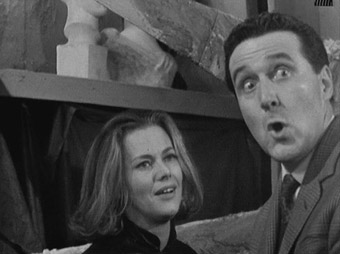
As with series 2, the mono soundtrack has a limited dynamic range but is free of damage and largely clear. Just occasionally the dialogue gets a little lost in the background noise or music – the bagpipes in Esprit de Corps are a good example – but this is one of the pitfalls of recording the show live and playing the music on set as you do so.
Disc 1
Brief for Murder commentary with Brian Clemens
The writer of this episode and a key figure in shaping the series that followed provides a busy, enjoyable and pause-free insight into how he got started in screenwriting and on The Avengers in particular, dividing his time between comments on this episode and the show in general, depending on the questions asked by moderator and Avengers enthusiast Jaz Wiseman. He has plenty of stories about his work on the series, including a tale of an extra who forced a restart of on Brief for Murder by getting his single word of dialogue wrong. He has high praise for McNee ("Patrick brought everything to the character") and puts the record straight regarding Peter Hammond's lack of involvement in the later, shot-on-film shows. Great stuff.
Image Galleries
A gallery of production stills is provided for each episode. They vary in length but can be extensive – the one for Brief for Murder has about 180 pictures alone. There are some goodies in here, particularly the shots of actors between takes, relaxing or reacting to each other.
DVD-Rom Content
PDF documents are supplied of the scripts for all four episodes on the disc, plus the cover and relevant inside pages of a TV Times for the week Brief for Murder was screened, pages from Scottish Television's The Viewer magazine (including an Avengers comic strip), the Northern edition of TV Times, and a reproduction of a 44-page Meet the Avengers magazine.
Disc 2
Man With Two Shadows commentary with Don Leaver
Jaz Wiseman chats with director Don Leaver, who suggests this was an episode that cried out to be shot on film and talks about how he came to the show, the casting of Patrick McNee, the sense of excitement and workload that came with the live broadcasts, the importance of the set designs and a good boom operator, relationships with colleagues, constructing a camera script, the professional pride of camera crews and a whole lot more. Wiseman finds some plausible parallels between this episode and The Prisoner, and Leaver expresses his bemusement at the continuing interest in the series. Busy and enthralling stuff until near the end, where both men stop talking to watch the show.
The Grandeur That Was Rome commentary with Richard Bates
Story editor Richard Bates relates in some detail how he came to the job and how a typical work day used to unfold. He recalls the same story of the actor fluff in Brief for Murder as the only time they had to re-shoot a show due to performer error, briefly covers his disagreements with producer Leonard White, and suggest that McNee very much saw himself as the star of the show. Like Leaver, he describes the process of filming a live show and is amazed by the interest the series still generates. He does intermittently comment on this episode, including Steed's unexplained escape from seemingly certain death.
Episode Introductions
These consist of snippets of interviews with Patrick McNee and Honor Blackman about various aspects of the show that may or may not be specific to the episode in question. You'll find them on quite a few of the episodes in this set, but every one has been lifted from the Avenging the Avengers documentary of the extended interviews from the same on disc 7. You can thus safely skip them and watch the whole thing there if you choose. On this disc there the only intro is on Don't Look Behind You, where McNee talks about Peter Hammond being the best if the show's directors.
Image Galleries
Four more extensive collections of production stills for the episode on this disc, including some colour material.
DVD-ROM Material
Scripts for all four episodes in PDF format. These, it should be mentioned, are scans of the original typed scripts rather than electronic reproductions.
Disc 3
Episode Introductions
Introductions here for The Undertakers, where McNee and Blackman talk about the relationship between the lead characters, Death of a Batman (the physicality of Cathy's fighting) and November Five (what McNee brought to the character of Steed).
Image Galleries
Stills for all four episodes, some of which are in colour.
DVD-ROM material
PDF files of all four scripts for the episodes on this disc.
Disc 5
Episode Reconstruction – Double Danger (18:04)
A reconstruction of a lost episode from series 1 using original scripts, off-screen 'telesnaps', on-set photos and a newly recorded narration that describes the plot. Though obviously not the same as having the actual episode, it provides a surprisingly effective flavour of how it must have looked and played.
Episode Introductions
These are provided for Second Sight (the pressure of shooting live), The Gilded Cage (Cathy's leather costume) and The Medicine Men (Cathy's lack of lovers and Honor's departure).
Image Galleries
Stills galleries are once again provided for all four episodes.
DVD-ROM Material
PDFs of the scripts for all four episodes, plus the camera and rehearsal scripts for the lost series 1 episode Double Danger and a reproduction of a Psychology Magazine article in which the series is psychoanalysed (!).
Disc 5
Episode Reconstruction – A Change of Bait (16:39)
Another useful reconstruction of a lost episode using stills, the original script and narration.
Episode Introductions
Intros for The Wringer, in which McNee talks about the new young writers, their ahead-of-their time ideas and his intense dislike of Star Trek: The Next Generation, and the Little Wonders, where the subject of guns and leg holsters is touched on.
DVD-ROM Material
All four scripts in PDF format, plus the script for the reconstructed episode A Change of Bait.
Image Galleries
Lots more production photos for all four episodes.
Disc 6
Mandrake commentary with Roger Marshall
Jaz Wiseman hands the moderator's job for this one commentary over to Henry Holland, whose enthusiasm for this episode – something of a fan favourite apparently – knows no bounds. He chats to episode writer Roger Marshall about how the idea for the story came about, writing for different Avengers girls, individual cast members, and the importance of good set design, amongst other things. Inevitably and appropriately the Jackie Pallo knockout is covered in detail, and Holland rounds off a lively and enjoyable conversation by saying of the episode "you can't improve on perfection" – it may sound a bit bum-licky, but this is actually the result of genuine fan-boy enthusiasm.
The Outside-In Man commentary with Jonathan Alwyn
Well-spoken episode director Alwyn kicks off another compelling commentary by correcting moderator Jaz Wiseman on the pronunciation of his name, then settles down to discuss how he first came to work on The Avengers (I've a feeling Wiseman had a check sheet of questions to ask of everyone he talked to, but all are worth asking), his preference for studio work, his involvement in the casting process, working with McNee, filming the fights, the set design and the lasting appeal of the series, and more. He tellingly suggests that the plots were seen as a clothes line on which to hang the show's style and technique, and observes how nice it is to watch end credits without someone talking over them to tell you what's on next.
Armchair Theatre – The Importance of Being Earnest, starring Patrick McNee – Act 3 Only (18:07)
A welcome chance to see McNee in a non-Avengers role as he acts alongside Ian Charmichael, Fenella Fielding (who also appears alongside McNee here in The Charmers), Pamela Brown, Irene Handl and Susannah York in one of Oscar Wilde's most celebrated plays. Like the series itself, this is in very good shape.
Image Galleries
Stills are only provided for two of the episodes here, Mandrake and The Outside-In Man and these are are little light on content.
DVD-ROM Material
Scripts for all three episodes are provided.
Disc 7
Avenging the Avengers (25:04)
The story of how The Avengers came into being and was later developed is told through interviews with key cast and crew members, bits of which have been lifted for the episode introductions. A lot of what's discussed here is also covered elsewhere, but this is still a nicely concise piece that covers a lot of ground, including the Emma Peel and Tara King years – Linda Thorson is interviewed, but with Diana Rigg apparently unwilling to talk about the series any more, her views are represented through archive interview. McNee tells an amusing Peter O'Toole story here, and series director Robert Fuest (who also gave us the Dr. Phibes films, bless him) suggests that The Avengers is "a wonderful example of avoiding the tyranny of common sense."
Avenging the Avengers – Extended Interviews (9:46)
More interview material from McNee, Blackman and Thorson that was not included in the above and has also been borrowed from for the episode intros. Some good stuff here and a worthwhile inclusion.
Honor's Judo Book (1:16)
A brief news item in which an even more lovely than usual Honor Blackman talks about learning judo to a reporter she then demonstrates it on.
Gale Force Part 2 (17:58)
A follow-on from the interview on the previous box set in which Honor Blackman talks about learning judo with a group of sweaty men, doing the fight sequences, the Jackie Pallo incident, motorbike riding for Build a Better Mousetrap, working with McNee, and the show's fantasy elements.
Episode Introductions
Intros here for The Charmers (the supporting cast, guest actors and the actors' 'do and don't' lists for writers) and Esprit de Corps (the show's offbeat take on reality, McNee's improvisations).
DVD-ROM Material
The scripts for all three episodes on the disc.
Once again Optimum have done The Avengers proud, with solid transfers, five excellent commentaries, PDF documents of all of the scripts and other related printed material, and reconstructions of two of the lost episodes from series 1. I grew up on the Emma Peel episodes, but I have a distinct feeling that when series 4 arrives I'm going to miss Cathy Gale and the studio format a lot more than I would ever have anticipated. Highly recommended.
|